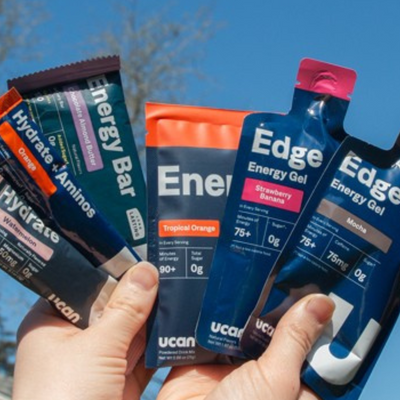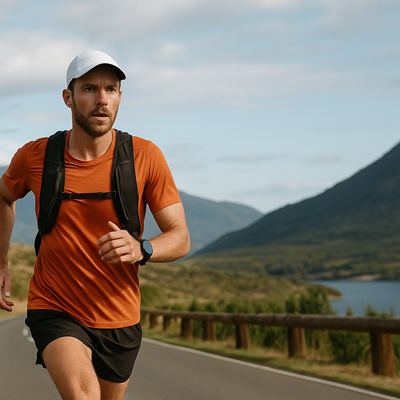Caffeine is one of the most widely consumed performance-enhancing substances in the world. For athletes and fitness enthusiasts, caffeine can offer a boost in energy, focus, and endurance during exercise. But how does caffeine really affect athletic performance? What's the best way for athletes to use caffeine before a workout? And how does UCAN's lineup of Edge Energy Gels with caffeine fit into a smart fueling strategy?
In this article, we'll explore how caffeine works in the body, its benefits and potential drawbacks for athletes, and how to incorporate caffeine strategically into your workout routine for optimal sports performance.
What is Caffeine and How Does It Work?
Caffeine is a natural stimulant found in coffee, tea, chocolate, and many energy products. When consumed, caffeine blocks adenosine receptors in the brain, reducing feelings of fatigue and increasing alertness. It also stimulates the release of adrenaline, preparing the body for physical exertion (Healthline, 2023).
Benefits of Caffeine for Athletes
1. Improved Endurance Performance
Studies show that caffeine can increase endurance by mobilizing fatty acids from fat stores, sparing muscle glycogen for prolonged exercise (Science for Sport, 2023).
2. Enhanced Focus and Reaction Time
Caffeine's effect on the central nervous system can sharpen focus, improve concentration, and decrease perceived exertion during workouts.
3. Increased Strength and Power Output
Some research indicates that caffeine can slightly improve strength, sprint performance, and power output in resistance training and high-intensity sports (Healthline, 2023).
Optimal Timing of Caffeine Before a Workout
Research suggests that consuming caffeine 30-60 minutes before exercise leads to peak performance benefits (Human Performance Alliance, 2023). The exact timing can vary based on factors like individual metabolism, body weight, and tolerance.
How Much Caffeine is Best for Athletes?
The International Society of Sports Nutrition recommends 3-6 mg of caffeine per kilogram of body weight for optimal performance benefits (Science for Sport, 2023). For a 150-pound (68 kg) athlete, this equates to 200-400 mg of caffeine. However, individual tolerance varies widely.
Natural Sources of Caffeine for Athletes
-
Coffee (80-100 mg per 8 oz cup)
-
Tea (30-50 mg per 8 oz cup)
-
Energy Gels and Pre-Workout Supplements
-
UCAN Edge Energy Gels with Caffeine
Introducing UCAN Edge Energy Gels with Caffeine
UCAN offers three delicious and functional caffeine-powered energy gels designed for athletes seeking steady energy without the sugar crash:
Salted Caramel + Caffeine Edge
A smooth, indulgent flavor with 75 mg of caffeine for lasting energy and focus. Perfect for long training sessions or endurance events.
Mocha Edge + Caffeine
A rich coffee-inspired flavor delivering 75 mg of caffeine with zero sugar. A great option for athletes who love the taste of coffee pre-workout.
Vanilla Latte Edge + Caffeine
A creamy, balanced flavor with 75 mg of caffeine to fuel body and mind. Easy on the stomach and optimized for endurance performance.
All UCAN Edge Energy Gels are powered by LIVSTEADY™, a proprietary slow-burning carbohydrate that provides up to 90 minutes of steady energy without spikes or crashes.
Looking for Energy Without Caffeine?
For athletes who prefer to avoid caffeine or want energy support without stimulants, UCAN also offers a range of Energy Powders and Energy Gels without caffeine. These products provide the same steady, long-lasting energy powered by LIVSTEADY™, designed to help you perform your best without sugar spikes or crashes.
Considerations and Potential Drawbacks of Caffeine Use
1. Sleep Disruption
Avoid caffeine in the late afternoon or evening to prevent disrupted sleep patterns.
2. Gastrointestinal Issues
Large doses of caffeine may cause stomach upset in sensitive individuals.
3. Caffeine Dependence
Consuming caffeine regularly may lead to dependence or tolerance, reducing its effectiveness.
FAQ: Caffeine, Exercise, and Athletes
Is caffeine good before a workout?
Yes, caffeine has been shown to improve endurance, focus, and power output when consumed 30-60 minutes before exercise.
How much caffeine is safe for athletes?
3-6 mg per kg of body weight is generally effective. Always start with a lower dose to assess tolerance.
Can I drink coffee instead of taking a pre-workout supplement?
Absolutely. Coffee is a natural source of caffeine and can be a suitable pre-workout beverage.
Are UCAN Energy Gels better than coffee for athletes?
UCAN Energy Gels provide both caffeine and a slow-release carbohydrate for sustained energy, making them an ideal choice during endurance training or competition.
Final Thoughts
Caffeine is a proven and effective performance enhancer for athletes when used strategically. Whether you're drinking coffee before a morning run or using UCAN's Salted Caramel + Caffeine Edge during a marathon, the key is timing, dosage, and listening to your body.
Explore UCAN's full lineup of Energy Gels with caffeine to elevate your sports performance and fuel your workouts smarter.
If you're looking for non-caffeinated energy options, check out UCAN's Energy Powders and Energy Gels for clean, long-lasting fuel without the crash.
References
-
Healthline. (2023). "Coffee Before Workout: Pros, Cons, and Considerations." https://www.healthline.com/nutrition/coffee-before-workout
-
Healthline. (2023). "Caffeine and Exercise: Performance Benefits and Risks." https://www.healthline.com/nutrition/caffeine-and-exercise
-
Science for Sport. (2023). "Caffeine and Sports Performance: Pros, Cons, and Considerations." https://www.scienceforsport.com/caffeine-and-sports-performance-pros-cons-and-considerations/
-
Human Performance Alliance. (2023). "Optimal Timing of Caffeine for Physical Performance." https://humanperformancealliance.org/playbook/whats-the-optimal-timing-of-caffeine-for-physical-performance/








